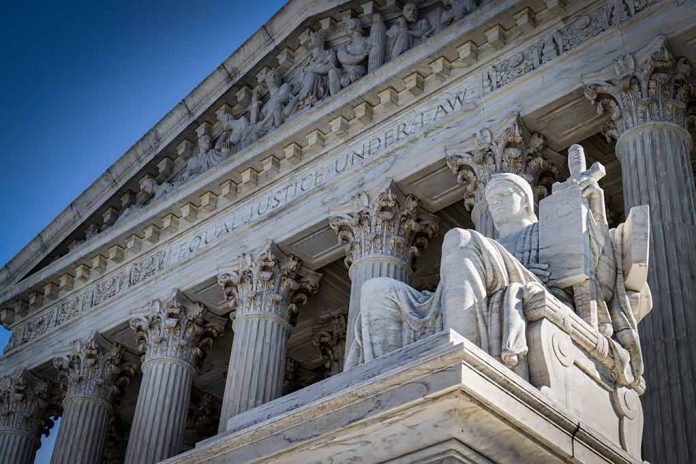
The Supreme Court has delivered multiple decisive victories for the Trump administration, allowing continued deportation of Venezuelan migrants and halting orders to reinstate fired federal employees.
Key Takeaways
- The Supreme Court overturned a lower court’s halt on Venezuelan deportations, ruling the case was filed in the wrong jurisdiction.
- Chief Justice John Roberts issued an administrative stay pausing a lower-court order requiring the release of over $1.5 billion in foreign aid.
- The Court halted a California judge’s order to reinstate 16,000 dismissed federal employees, allowing the administration to continue its agency restructuring.
- All nine justices agreed migrants must receive advance notice and opportunity to challenge deportation, potentially creating new restrictions on use of the Alien Enemies Act.
- These rulings collectively signal legal momentum for Trump’s immigration policies and federal agency reforms.
Supreme Court Greenlights Venezuelan Deportations
In a significant ruling, the Supreme Court has allowed the Trump administration to continue deporting Venezuelan migrants using a wartime powers act, specifically the Alien Enemies Act. The 5-4 decision overturned a lower court’s temporary halt on these deportations. The Court’s ruling hinged on procedural grounds, stating that the lawsuit challenging the deportations was filed in Washington, D.C., rather than Texas, where the migrants are being detained.
While allowing deportations to continue, the Court established important parameters. All nine justices, despite their differences on venue, concurred that migrants must receive advance notice and the opportunity to challenge their deportation. The Court’s order specifically mandated that migrants be informed of their removal “within a reasonable time” to permit appropriate legal challenges.
🚨🚨 BREAKING: #SCOTUS delivers major victory for @realDonaldTrump's Administration: Can immediately begin deporting gang members again; Judge Boasberg set straight and off the case. Barrett sold out…again. #MAGA #MassDeportation #LiveLifeBoldly pic.twitter.com/n22QennSpy
— Regular Joe (@RegJoeShow) April 8, 2025
Foreign Aid Funding Freeze Upheld
In another victory for the administration, Chief Justice John Roberts issued an administrative stay that pauses a lower-court order requiring the Trump administration to release over $1.5 billion to aid organizations. This decision marks one of President Trump’s first legal victories in his second term, allowing the continued freeze of funding to organizations like the AIDS Vaccine Advocacy Coalition and the Journalism Development Network.
The administration’s directive had temporarily halted foreign assistance for a 90-day period, which a lower court judge had previously ordered to resume. The Supreme Court’s intervention gives the justices time to review the case more thoroughly, with potential outcomes ranging from extending the pause indefinitely to requiring the eventual release of these funds. This aligns with the administration’s broader plans to significantly reduce foreign aid spending.
Federal Employment Restructuring Proceeds
The Supreme Court delivered yet another win by halting a lower court order that would have required the Trump administration to reinstate thousands of dismissed federal employees. This ruling came in response to an emergency appeal of a California judge’s decision to reinstate approximately 16,000 probationary employees who had been terminated. The affected employees from six federal agencies will remain on paid administrative leave while the case continues.
A parallel lawsuit in Maryland resulted in a similar ruling blocking the firings, which applies in 19 states and the District of Columbia. The Justice Department is actively appealing this Maryland decision as well. These legal victories allow the administration to continue its efforts to reshape federal agencies according to its priorities while the underlying legal issues proceed through the courts.
Implications for Executive Authority
These consecutive Supreme Court rulings indicate growing legal momentum for the Trump administration in reshaping federal agencies and implementing its immigration policies. While the Court has allowed these initiatives to proceed, it has also established important guardrails, particularly regarding the use of the Alien Enemies Act. The requirement that migrants receive timely notice and opportunity to challenge deportation could impose new restrictions on future use of this wartime authority.
The combined effect of these rulings reinforces executive authority while simultaneously defining its limits. For the administration, these victories provide breathing room to continue implementing its policy agenda across multiple fronts. For observers of the judicial system, these cases highlight the Supreme Court’s ongoing role in balancing executive power with procedural safeguards, particularly in areas of immigration enforcement and government restructuring.
Sources:
Supreme Court Clears Way for Venezuelan Deportations to Resume, for Now
SCOTUS Hands Trump His First Legal Victory of Second Term
Supreme Court Hands Donald Trump Another Win



